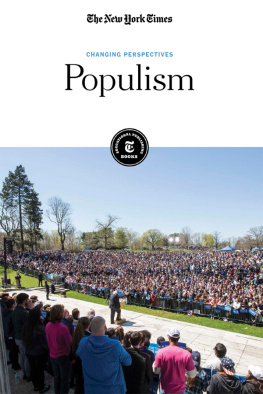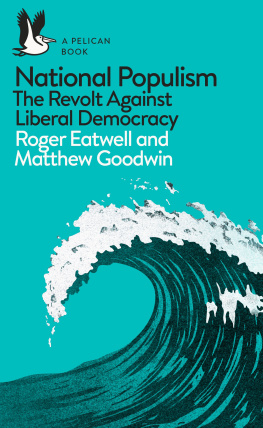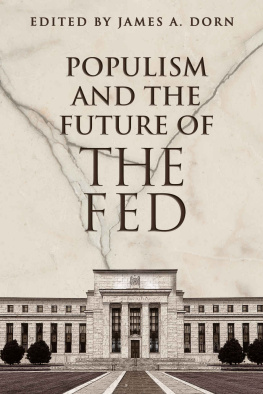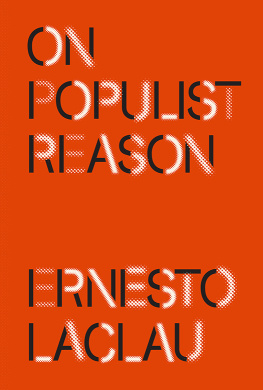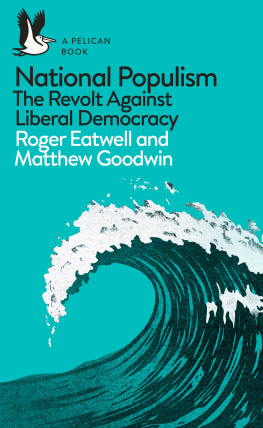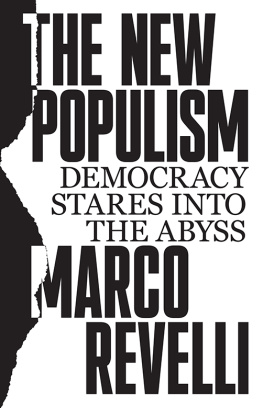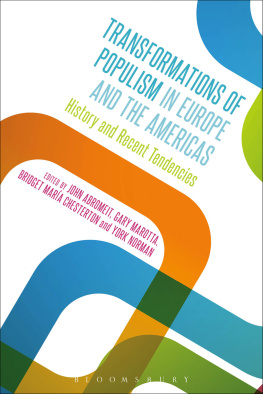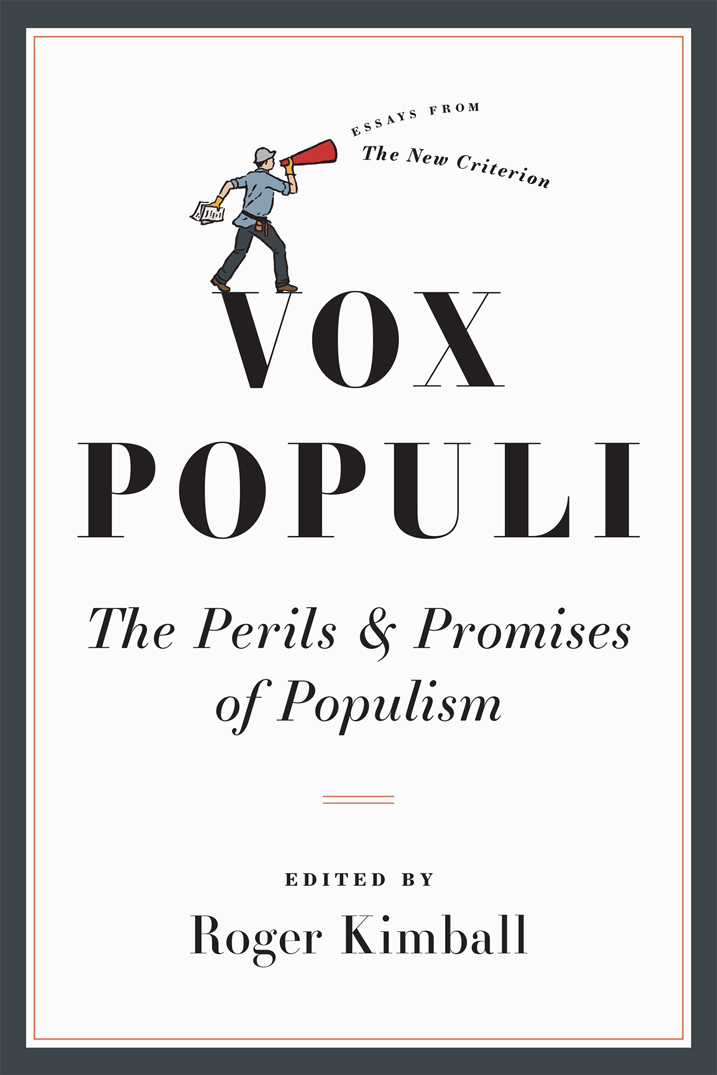


2017 by Roger Kimball;
the individual chapters, the individual authors
All rights reserved. No part of this publication may be reproduced, stored in a retrieval system, or transmitted, in any form or by any means, electronic, mechanical, photocopying, recording, or otherwise, without the prior written permission of Encounter Books, 900 Broadway, Suite 601, New York, New York, 10003.
First American edition published in 2017 by Encounter Books, an activity of Encounter for Culture and Education, Inc., a nonprofit, tax exempt corporation.
Encounter Books website address: www.encounterbooks.com
The paper used in this publication meets the minimum requirements of ANSI/NISO Z39.481992 (R 1997) (Permanence of Paper).
FIRST AMERICAN EDITION
LIBRARY OF CONGRESS CATALOGING-IN-PUBLICATION DATA IS AVAILABLE
Names: Kimball, Roger, 1953 editor.
Title: Vox populi: the perils and promises of populism / edited by Roger Kimball.
Other titles: Vox populi (Encounter Books)
Description: New York: Encounter Books, 2017. | Includes index.
Identifiers: LCCN 2017039035 (print) | LCCN 2017049412 (ebook)
ISBN 9781594039584 (Ebook)
Subjects: LCSH: Populism. | PopulismUnited States.
Classification: LCC JC423 (ebook) | LCC JC423 .V68 2017 (print) | DDC 320.56/62dc23
LC record available at https://lccn.loc.gov/2017039035
CONTENTS
Table of Contents
Guide
The ten essays that comprise this book began life in The New Criterion throughout the course of our thirty-fifth anniversary season beginning in September 2016. We had already begun thinking about commissioning a series on populism when the world was stunned by the successful British referendum, in June 2016, to take Britain out of the European Union. In the United States, the effervescent presidential campaigns of Bernie Sanders and Donald Trump were, in their different ways, pushing the term populism to the forefront of public debate and, indeed, public anxiety. In continental Europe, kindred phenomena had focused public attention on a wide variety of figures and movements that were hailed or dismissed as populist.
Still, I dont suppose that there is any term that has instilled more confusion over the last couple of years than populism. In many ways, it is a word in search of a definition. For many people, populism is like the term fascism as George Orwell saw it: a handy negative epithet, a weapon, whose very lack of semantic precision is one of its chief attractions. Anything or anyone you dont like can be effectively impugned if you manage deploy the F word and get it to stick. But what does it mean? Ninety-nine times out of a hundred it means little more than I dont like this person or this policy. Connoisseurs of cant will have noticed that the term racism has a similar all-purpose, content-free aura of malignity, but exploring that malodorous development is a topic for another day.
When it comes to understanding populism, history can be as confusing as it is illuminating because many of the standard historical examples one encounters have but a tenuous connection with what is today denominated as populist. Most surveys of the subject start with Tiberius and Gaius Gracchus, the Roman Tribunes who in the late Republic agitated for land reform and grain allotments for the poor. As Barry Strauss reminds us in Populares and Populists below, they also introduced mob violence to the metabolism of Roman political life and were, a decade apart, murdered, in the case of Tiberius, or driven to suicide, as for Gaius, by their patrician opponents.
But what lessons do the Gracchi brothers, or later Roman populists like Gaius Marius or Julius Caesar, have to tell us about the signal populist movements of our own day? Doubtless, they offer a salutary admonition, but, at least in the United Kingdom and the United States, any supposed parallels seem tenuous. I would extend that epistemic stinginess to more modern allotropes of populism like Huey Long and Father Coughlin, two other figures who make at least cameo appearances whenever populism is the topic du jour.
It is often said that populism is anti-elitist, but again, when it comes to phenomena like Brexit or the election of Donald Trump, I am not sure that the effective opposition is between elites, on the one hand, and us common folk, on the other. Often, I believe, the putative elites turn out not to be particularly elite or elevated, merely to be possessed through no virtue of their own of an abundance of state power.
My own feeling is that most contemporary examples of what are called populist movements are at bottom movements to force the question Who rules? Populism, in this understanding, is primarily about the question of sovereignty. I am convinced that the issue of sovereignty, of what I call in my concluding essay in this volume the location of sovereignty, has played a large role in the rise of the phenomenon we describe as populism in the United States as well as in Europe. For one thing, the question of sovereignty, of who governs, stands behind the rebellion against the political correctness and moral meddlesomeness that are such conspicuous and disfiguring features of our increasingly bureaucratic society.
The issue of sovereignty also stands behind the debates over the relative advantages and moral weather of globalism vs. nationalism, as well as the correlative economic issues of underemployment and wage stagnation. Those whom James Madison castigated as theoretic politicians may advocate globalism as a necessary condition for free trade. But the spirit of local control tempers the cosmopolitan project of a borderless world with a recognition that the nation state has been the best guarantor not only of sovereignty but also of broadly shared prosperity. What we might call the ideology of free tradethe globalist aspiration to transcend the impediments of national identity and controlcame to seem to its critics an abstraction that principally benefits its architects.
Below, I quote Edmund Burkes 1770 essay Thoughts on the Cause of the Present Discontents on the Court of George III. Burke criticized the Court party of his day for circumventing Parliament and establishing by stealth what amounted to a new regime of royal prerogative and influence-peddling. It was not as patent as the swaggering courts of James I or Charles I. George and his courtiers maintained the appearance of parliamentary supremacy. But a closer look showed that the system was corrupt. It was soon discovered, Burke wrote with sly understatement, that the forms of a free, and the ends of an arbitrary Government were things not altogether incompatible. That discovery stands behind the growth of todays administrative state. Under the cloak of democratic institutions, its essentially undemocratic activities pursue an expansionist agenda that threatens liberty in the most comprehensive way, by circumventing the law.
At the same time, however, a growing recognition of the totalitarian goals of the administrative state has fed what many have called a populist uprising here and in Europe. Populist is one word for the phenomenon. An affirmation of sovereignty, underwritten by a passion for freedom, is another, possibly more accurate, phrase.



